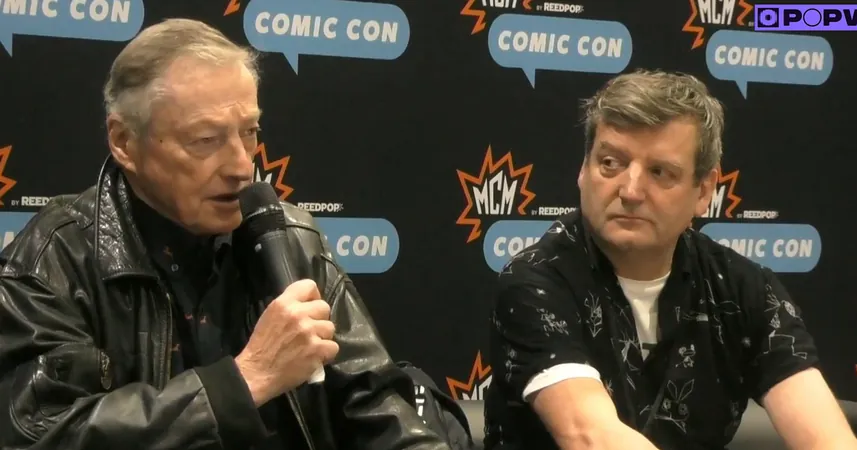
Behind the Scenes of 30 Years of PlayStation: Tales from the Pioneers
2024-12-06
Author: William
From Humble Beginnings: Aiming Low but Soaring High
When the PlayStation was set to debut, Sony Europe's initial expectations were modest. Chris Deering, who led PlayStation's European division until the PS3's launch, revealed, “The target was to sell just 3 million PS1 consoles over three years." Considering that Sony was entering a console market already dominated by Nintendo and Sega, those initial projections seemed prudent. However, the reality was far more successful, as they sold 10 million units and 40 million games within that timeframe. Deering emphasized the importance of fast access to game titles, stating, “The disc format allowed us to ramp up quickly. It was a game-changer that contributed to the PlayStation phenomenon.
Crafting a Cool Image
To appeal to a younger adult audience, the PlayStation UK marketing team cleverly integrated the console into the vibrant club and rave culture of the mid-'90s. "We aimed for an edgy brand image that resonated with 18 to 30-year-olds," Glendenning explained. By distributing thousands of consoles to influential figures in music and fashion—without any formal endorsements—the PlayStation brand became synonymous with coolness during this era. This grassroots marketing method relied purely on word of mouth, effectively creating a network of youthful ambassadors promoting the console.
A Lesson in Marketing: When Good Ideas Go Wrong
The panel also recalled some of the more outrageous marketing attempts, particularly a campaign for *Crash Bandicoot*. They created fake road signs and "lost pet" posters—a strategy that backfired when some marketing representatives encountered trouble in Soho's infamous phone boxes owned by local figures. Geoff Glendenning noted, "Our well-meaning campaign resulted in one of our staff getting beaten up. It was a lesson learned about the fine line in edgy marketing." Regardless, those creative tactics contributed to making *Crash Bandicoot* a beloved classic.
Unexpected Moments and Industry Relationships
Among the memorable moments, Deering shared a playful encounter with Richard Branson during a promotional event where the two faced off in *Tekken*. Deering humorously recounted winning the match, stating, "It would’ve been embarrassing to lose to him!" Such interactions highlighted how PlayStation sought to integrate itself within popular culture while strengthening ties with influential figures.
Shocking Sales: The Unexpected Hit
While many may assume titles like *Tomb Raider* or *Gran Turismo* were the top-sellers on the PS1, the crown actually went to Ubisoft’s *Rayman*. It reached the top due to smart marketing, bundling, and pricing strategies, showcasing the importance of strategic planning in gaming sales.
Against the Odds: Launching the PS2
As excitement grew for the PS2's release, skepticism lingered within the trade media and among competitors. Deering recounted how some said there was no way a single platform could dominate across two generations. Despite this, the PS2 went on to become the best-selling console of all time, thanks in part to strategic exclusivity deals—with *Grand Theft Auto* being a standout win for PlayStation.
Navigating Challenges: PS3 and PS4 Developments
Among the discussions, Wilson underscored the challenges surrounding the launch of the PS3, referring to it as their "difficult third album" due to its late entry into the market and higher price point. He contrasted this with the PS4's much smoother launch, despite their initial anxiety about competing against Xbox, which had already made a big splash in the market with its Kinect feature. Interestingly, the PS4's development was not without its setbacks; London Studio found themselves in a quandary about incorporating the camera technology they had invested in, given that only a small percentage of gamers would use it.
Conclusion: A Legacy of Innovation and Resilience
Reflecting on these moments, it's clear that the legacy of PlayStation is built on innovation, risk-taking, and a deep understanding of youth culture. As these pioneers shared their stories, it became evident that while the gaming landscape has evolved, the spirit of exciting and unconventional marketing lives on, paving the way for future generations of gamers. PlayStation's 30-year journey is a testament to the power of creative thinking and adaptability in an ever-changing industry.



 Brasil (PT)
Brasil (PT)
 Canada (EN)
Canada (EN)
 Chile (ES)
Chile (ES)
 Česko (CS)
Česko (CS)
 대한민국 (KO)
대한민국 (KO)
 España (ES)
España (ES)
 France (FR)
France (FR)
 Hong Kong (EN)
Hong Kong (EN)
 Italia (IT)
Italia (IT)
 日本 (JA)
日本 (JA)
 Magyarország (HU)
Magyarország (HU)
 Norge (NO)
Norge (NO)
 Polska (PL)
Polska (PL)
 Schweiz (DE)
Schweiz (DE)
 Singapore (EN)
Singapore (EN)
 Sverige (SV)
Sverige (SV)
 Suomi (FI)
Suomi (FI)
 Türkiye (TR)
Türkiye (TR)
 الإمارات العربية المتحدة (AR)
الإمارات العربية المتحدة (AR)